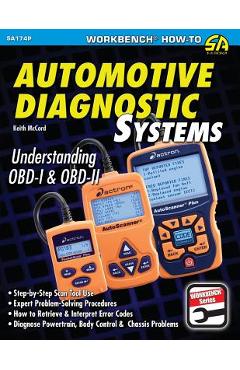Automotive Diagnostic Systems: Understanding OBD-I & OBD-II - Keith Mccord

Detalii Automotive Diagnostic Systems: Understanding OBD-I
libris.ro
213.97 Lei
237.75 Lei
Transportation
Keith Mccord
Automotive Diagnostic Systems: Understanding OBD-I - Disponibil la libris.ro
Pe YEO găsești Automotive Diagnostic Systems: Understanding OBD-I de la Keith Mccord, în categoria Transportation.
Indiferent de nevoile tale, Automotive Diagnostic Systems: Understanding OBD-I & OBD-II - Keith Mccord din categoria Transportation îți poate aduce un echilibru perfect între calitate și preț, cu avantaje practice și moderne.
Caracteristici și Avantaje ale produsului Automotive Diagnostic Systems: Understanding OBD-I
- Departament: sport-activitati-aer-liber
- Perfect pentru activități sportive și de aventură în aer liber.
Preț: 213.97 Lei
Caracteristicile produsului Automotive Diagnostic Systems: Understanding OBD-I
- Brand: Keith Mccord
- Categoria: Transportation
- Magazin: libris.ro
- Ultima actualizare: 28-10-2025 01:22:05
Comandă Automotive Diagnostic Systems: Understanding OBD-I Online, Simplu și Rapid
Prin intermediul platformei YEO, poți comanda Automotive Diagnostic Systems: Understanding OBD-I de la libris.ro rapid și în siguranță. Bucură-te de o experiență de cumpărături online optimizată și descoperă cele mai bune oferte actualizate constant.
Descriere magazin:
The photos in this edition are black and white. The electronic control unit and other electronic controls are connected to every major system of a car built within the past 15 years, yet when there is a problem or an error code, many enthusiasts do not know how to go about fixing the problem. With this book, an affordable hand held scanner, and other common tools, the average enthusiast can diagnose and fix most common problems, rather than bringing the vehicle to a dealership for repair at shop rates of $100 per hour or more. Keith McCord recounts the history of automotive onboard diagnostic systems and creation of the rudimentary OBD I systems and the development as well as the evolution of OBD II. Currently, OBD-II (OnBoard Diagnostic II) is the standard of the industry, and this book provides a thorough explanation of this system. It details its main features, capabilities, and characteristics. It shows how to access the port connector on the car, the serial data protocols, and what the serial data means. To understand the diagnostic codes, the numbering system is defined and the table of common DTCs is shown. But most importantly, McCord provides a thorough process for trouble shooting problems, tracing a problem to its root, explaining why DTCs may not lead to the source of the underlying problem, and ultimately resolving the problem. Almost anyone can hook a scanning tool up to the serial port and read the error, but the key to fixing the problems is using an effective trouble shooting process that resolves all the issues that may be contributing or creating the problem. McCord provides sound procedures, insight, and information for resolving most ECU and computer control problems at home with affordable consumer-grade scanners.

Produse asemănătoare
Produse marca Keith Mccord

Automotive Diagnostic Systems: Understanding OBD-I & OBD-II - Keith Mccord
![]() libris.ro
libris.ro
Actualizat in 28/10/2025
213.97 Lei